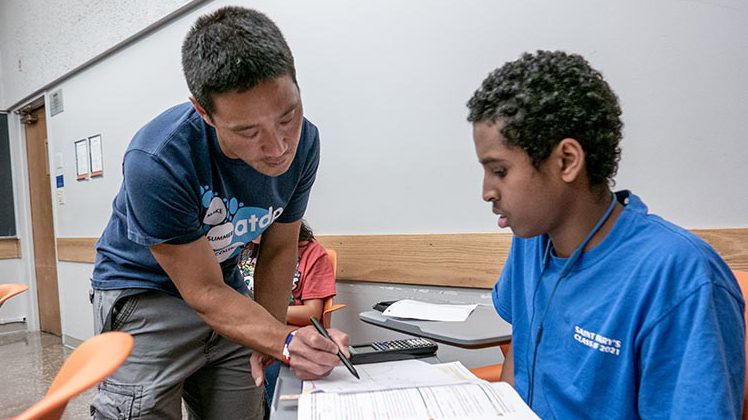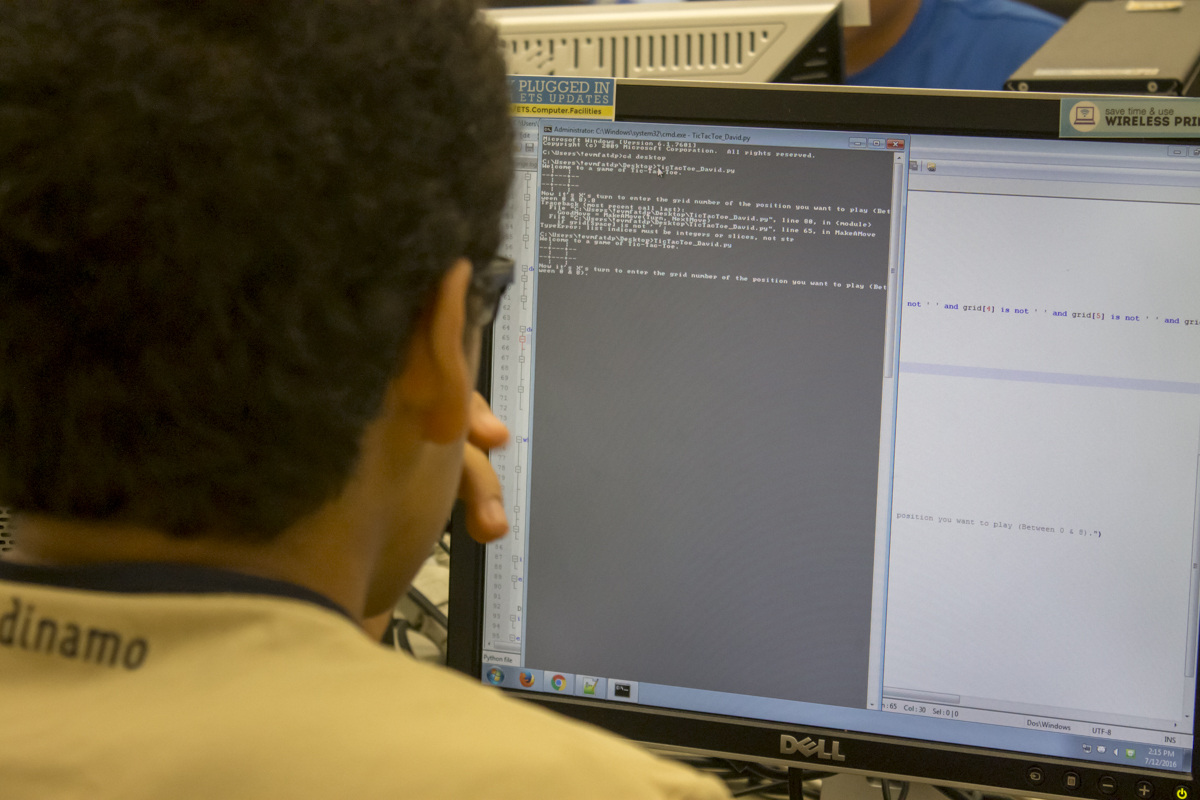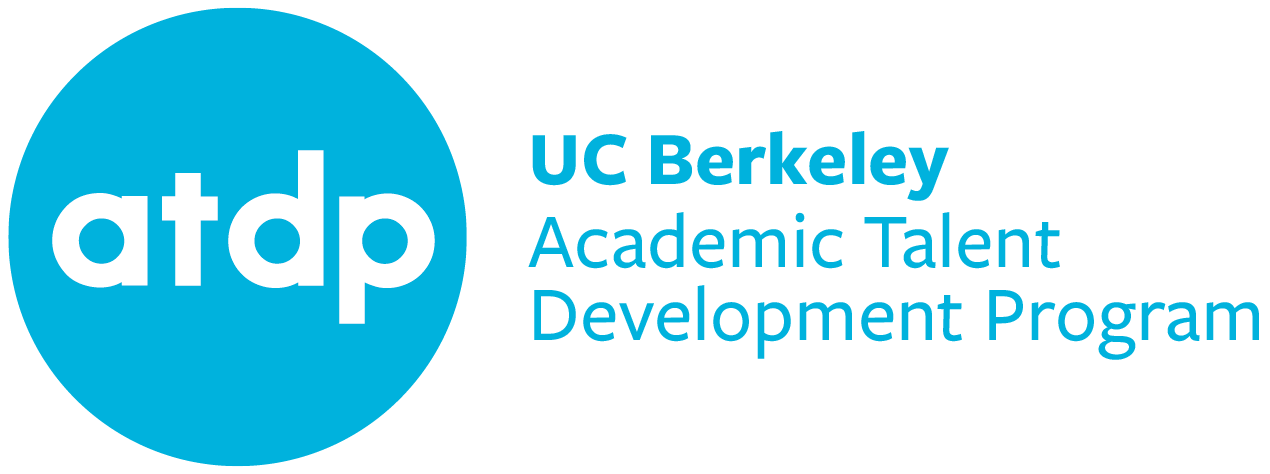Secondary Division 2020
Online Student Guide
What to Expect


We want to preserve our vibrant community
ATDP courses aren't just about the curriculum. Every summer, students come from far and wide to share their interests with one another, work in class together, and make new friends. In a time of social distancing, it is all the more important that we find ways to maintain students' opportunities for connection.

We continue to emphasize active and collaborative learning
We heard you: the #1 factor that's important to SD families is having an engaging, live connection between students and instructors. We've always united teachers who are passionate about their subject with students who love to learn, and it's clear that our top priority should be preserving that interactive, collaborative nature of our classes. SD class sessions will include a mix of live ("synchronous") and self-directed ("asynchronous") instruction and activity, and instructors will be planning at least two hours of face-to-face time spread across each week (three hours for full year-equivalent courses).

Same rigor, different format
We aim to provide the same academic challenge that students have come to expect every summer at Cal, even though we won't be able to meet on campus this year. Instead, we'll be using Zoom, which is UC Berkeley's officially supported remote instruction platform. (We know you might have questions about Zoom; see our technology FAQs below.) Enrolled students will be required to join video conferences on Zoom so that they can interact with their instructor and fellow students face-to-face.
Catalog Updates
Our instructors are working to adapt their courses to be delivered online. Some modifications may be minor, some major, and some courses may be revised entirely. Others may be canceled because the instructor isn't able to teach the course online. If you need to request a different course or wait pool, see Requesting a Course Change.
Updated calendar
Many dates and deadlines have been pushed back to give everyone a little more time to prepare. This includes new timelines for tuition payments and financial aid. See the revised SD calendar.
New & revised classes
The following courses have been added or significantly revised for the online program:
- Public Speaking on the Digital Frontier (formerly "Intro. To Public Speaking")
- Intro. to Innovation and Entrepreneurship (new course)
- Business & Finance (new schedule)
- Introduction to Engineering (new schedule)
- Advanced Robotic Engineering (now including Arduino projects)
Classes with new supply lists
The following courses now require students to purchase special supplies (grocery items, for example) where they previously did not. Their course descriptions each include additional notes. This list does not include Fundamentals of Art or Architectural Design, which have always required students to purchase special supplies.
- Intro. to Higher Algebra: paper and camera*
- Applied Mathematics: paper and camera*
- Intro. to Engineering: build-at-home kits (order online)
- Introductory Chemistry: grocery/pharmacy supplies
- Advanced Robotic Engineering: build-at-home kits (order online)
- Cognitive Neuroscience: paper and camera*
- Intro. to Cancer Research: paper and camera*
* Students will need to turn in photos of their completed coursework; a decent phone camera is acceptable.
Canceled classes
If you were placed in a class that has been canceled, you will be considered for any course you have already selected as an alternative or for which you are in the wait pool. You are also encouraged to provide us with additional course choices (see Requesting a Course Change).
- Geometry
- Algebra II/Trigonometry
- Intro. to Biotechnology
Preparing for Class
Good study habits must begin even before the first class! Check off each item below as your summer at ATDP approaches.
- Review this Student Guide
You're doing it right now! Well done!
- Complete your Enrollment Form - due Wednesday, May 13th
Review the policies and procedures below before agreeing to enroll. See the Course Placement tab in your online account for details and tuition payment instructions. Need to withdraw? See Withdrawal & Refunds. - Register for Explorations
Optional. Students who have confirmed enrollment may sign up for Explorations online workshops & classes. Because of the shift in format, spots are much more limited this year, so act quickly! Once you've submitted your notification of attendance, you'll find the online Explorations Registration Form in the Forms section of your online account. - Contact your school counselor or principal
Optional. We recommend contacting a high school counselor or principal before the end of the school year if you wish to ask the school to list your ATDP class on its transcript. - Take the math placement test (if required)
Only for certain students: The Course Placement tab in your online account will include a note if you are required to test. Details regarding the new date and online format of our math placement testing will be published soon on our News page. - SD Welcome & Orientation Online
Recommended, optional. Even though we won't be able to bring everyone to campus on Sunday, June 7 as planned, we will be organizing an online version of our Secondary Division Orientation to welcome students and families, test technology, provide updates, and answer questions. Please keep an eye on our News page for details as they become available! - Review the Orientation Letter from your instructor
By June 10, instructors will have their Orientation Letter available to download, which usually includes one or more assignments due on the first day of class. This letter may also include any updates about textbooks, required supplies or software, and—if the class normally meets on Fridays—the make-up plan for the July 3 administrative holiday. - Purchase textbooks and supplies
Some teachers will require their students to buy textbooks, a course reader, or other items specified in a supply list. A link to your textbook information is in the Course Placement tab of your online account. Details about readers and supplies will be provided by your instructor in their Orientation Letter. - Complete your first assignment before the start of class
ATDP courses move fast and expectations are high! Expect to receive one or more assignments from your instructor that will be due by your first day of class.
Documenting coursework
In late August, ATDP will send students their instructor's final evaluation of their class performance. This document can serve as proof of course completion and includes the course grade, instructor's narrative, and whether high school credit is recommended. Students can earn grades of A+, A, A-, B+, B, B-, Pass, or No Pass.
Reporting your course to high schools
If you will be requesting that your high school list your ATDP course on the high school transcript, check with your school to determine their policy ahead of time. Some schools may agree to list an ATDP course on its transcript while others may not. When added to a transcript, some schools may grant credit for an ATDP course while others may not.
Recommendation of high school credit
You must earn a final course grade of A+, A, A-, B+, B or, in some cases, B- to receive a recommendation for credit for your ATDP course. Upon the family's authorization, ATDP will send the final evaluation report to the school with a recommendation for credit. To give authorization, students must visit their online ATDP account, or mark "Yes" on their Authorization to Send Evaluation postcard and return it to ATDP. As ATDP does not recommend credit for grades below a B, the final evaluations for such grades are only for the student and are not sent to schools.
High schools and districts have varying policies about whether students can list ATDP courses on the high school transcript. ATDP can recommend that a student receive credit for grades in the A and B range, but only the student's school can actually grant credit. ATDP's recommendation is for credit at the high school level, not for college-level credit. However, students taking AP-aligned courses can later earn college credit at participating institutions if they achieve a passing score on the AP exam.
Reporting your course to colleges
Many Secondary Division courses are A-G approved and can be reported on the UC or CSU college application, and these courses will count towards meeting the UC/CSU college entrance requirements.
For other colleges and universities, many applications will include an opportunity to list your ATDP coursework, though details may vary. If you wish your ATDP course to count towards entrance requirements at a non-UC/CSU college, your high school must accept ATDP's recommendation to list the course on its transcript for credit so that you can report it to the college.
In the fall, more detailed guidance will be emailed to ATDP students who are entering their senior year, as well as posted here on our website.
ATDP's A-G course list
In addition to the courses that are already approved for ATDP's A-G course list, many more will be submitted for approval throughout the year. These courses are listed as "in process" in our online catalog, and approval will be retroactive to include this year.
You can find the official up-to-date list at atdp.berkeley.edu/aglist.
Policies & Procedures
Follow instructions for making your tuition payment as you complete the online Enrollment Form. You can pay online using a card or by mailing in a personal check or money order. Mailed payments may take much longer than usual to process this year since we cannot receive mail at our office in the usual way. We recommend paying online if at all possible.
Tuition payments are due by May 13 for currently placed families and within 10 business days for applicants just now applying during our extended period. For families electing to pay in installments, a minimum amount of half (50%) of your tuition balance is due May 13, with the remaining balance to be paid in full no later than July 2. (For families requesting financial aid, the minimum deposit is $100.)
About our financial aid budget
ATDP is entirely self-supporting, and its budget for each 12-month period beginning July 1 is based on application and tuition fees received. Financial aid awards are made from a small percentage of the tuition paid for classes as well as individual donations specifically for the purpose of financial aid. The COVID-19 situation, which has resulted in lower incomes for many families, has also resulted in fewer applications to ATDP, fewer donations, and a fully online program, which comes with additional, unanticipated costs for technological and instructional supports. Thus, there is less funding for financial aid this year, requiring an adjustment to our usual financial aid process and schedule.
Changes to this year's process
Financial aid decisions have been deferred to June 1. Regardless of financial aid decisions, all families need to submit their minimum tuition deposit by May 13 in order to hold their spot in class. This year, the minimum deposit for families requesting financial aid is $100. This amount is fully refundable up until the June 5 refund deadline.
We will need to wait to see our enrollment and revenue numbers before we can determine the amount of financial aid (if any) that will be available this year. Those applying for aid (both those who already have and those who are requesting exceptions for late consideration) will receive notification regarding any adjustments to their balance.
All communications regarding changes in course selection must be in writing and sent to the ATDP office through the online Modify Course Selection form. You can find links to this online form in the Course Placement tab of your online account. You may only request courses for which you have not already been considered. You may also use this form to request to be added to the wait pool for a currently closed class or to petition for a second course.
Give the Director at least ten business days to review your request and do not send more than one copy of your request. We often need to wait for spaces to open up before we can make course changes, so please be patient. We will make changes until the end of May. We encourage you to consider courses even if they are currently full, as we may consider opening up additional spots if there is high demand. View our online catalog.
If you are requesting a course change and are planning to decline your current course placement, please act promptly in submitting your online Enrollment Form, selecting "no" to the notification of attendance. This will clear your spot for another student, which might improve your chance for a new placement.
We will send you a new course placement notice if we are able to accommodate your request. You will then have ten business days to accept or decline the new offer.
If you decide not to accept your course placement, you must select the appropriate option on the online Enrollment Form (in the Forms tab of your account). The form must be submitted no later than Wednesday, May 13th, 2020, but please complete it as soon as possible so that another student can be placed in the class. If you need to withdraw after you have completed your Enrollment Form, please email your written withdrawal notice to ATDP.
Prior to the full refund deadline (June 5th, 2020), payments are refundable. After this date, refunds are subject to the Refund Schedule; see below. No refund will be made in the case of a student who fails to attend classes or is withdrawn from ATDP for failure to meet the standards of appropriate behavior, including completion of homework. Students with outstanding balances after July 2, 2020 will be automatically withdrawn from the program without refund.
Due to the major change in our program format, families that withdraw may request that their application processing fee be refunded or credited towards an application for summer 2021. To make your request, send a brief email to atdpoffice@berkeley.edu with your student's name and whether you would like a credit or refund. Refunds will not be processed until later in the fall. Families also have the option of contributing their application fee towards ATDP's budget for financial aid, which may be heavily impacted this year.
| Refund Schedule | |
|---|---|
| Friday, June 5th | 100% Refund of tuition paid to date |
| Friday, June 12th | 40% Refund of tuition if paid in full |
| Friday, June 19th | 20% Refund of tuition if paid in full |
| No refund after June 19th | |
- All withdrawals from the Program must be made in writing (email).
- Withdrawal date is the email date.
- The refund amounts indicated are based on tuition paid in full.
- If paying in installments, refunds are issued only if tuition paid to date exceeds the refund amount according to the percentages above.
- Refunds will be issued by the end of August.
All students are expected to attend online meetings via the Zoom video-conferencing platform. Students will abide by all ATDP policies, including those regarding behavior, academic integrity, and attendance (see below) no differently than if attending an in-person class. Students who anticipate any problems in meeting the technology requirements of online class meetings must inform ATDP as soon as possible. (List these in the 'Concerns' section of your online Enrollment Form.)
Technology malfunctions or other difficulties that prevent full participation in class may constitute an absence and are not the responsibility of ATDP. Even provided good faith efforts on the part of the student and of ATDP to resolve technical issues, missing too much live class time may affect the student's grade, affect eligibility for a recommendation of credit, or result in dismissal from the program without refund.
Attendance policy
Missing too much class time for any reason may result in dismissal from the program without refund. There are no excused absences at ATDP. As expectations are high and courses are fast-paced, even one absence makes it difficult to keep pace; students are expected to attend every live online class meeting. Even in the case of unanticipated circumstances, there are some things that cannot be "made up" (such as introductions, class participation, group activities, etc). Students cannot miss the first two days of class.
Students who miss class time may not be eligible for a recommendation of credit and may not receive a final evaluation. Attendance decisions are not related to whether the student is taking the class for a possible recommendation of credit. Attending every class does not guarantee that a student will be recommended credit.
Anticipated attendance conflicts
All matters affecting regular attendance—absence, coming late, or leaving early—must be communicated in writing to the ATDP main office (not the instructor) by the parent/guardian (not the student). If there are special circumstances that will affect a student's ability to attend every live online class meeting please contact the program office in writing as soon as possible (you may use the 'Concerns' section of your online Enrollment Form). Anticipated absences not addressed prior to the June 5 refund deadline will not be accommodated.
Unanticipated attendance issues
If there is an unexpected absence (e.g., illness, emergencies)—including leaving before the end of the class meeting—the parent or guardian must contact the ATDP main office. Please note that unlike the regular school year, there are no excused absences at ATDP.
Tardies
Students must be on time to live online class meetings, and are expected to be ready to begin class exactly on time. Students who are tardy twice accrue an absence. Students who are tardy a third time may be dismissed from the program without refund.
Academic Integrity
ATDP requires a high level of responsibility and academic honesty from its students. Scholastic dishonesty includes but is not limited to cheating, plagiarism, collusion, the submission for credit of any work or materials that are attributable in whole or in part to another person, taking an examination for another person, any act designed to give unfair advantage to a student or the attempt to commit such acts. Any student who commits an act of scholastic dishonesty is subject to dismissal from ATDP without refund.
Behavior
Inappropriate/unacceptable conduct includes but is not limited to behavior that disrupts instruction, disrespects any member of the ATDP community, misuses technology used for instruction, or exhibits uncivil behavior. This also includes transmitting any inappropriate or objectionable behavior, imagery, speech, or other content during online meetings, whether intentional or unintentional. Any student who commits an act of inappropriate conduct, or whose family member commits such acts while interacting with ATDP staff, faculty or students, is subject to dismissal from ATDP without refund.
Disclosure
Parents or guardians of attending students must inform ATDP of any special circumstances or potential conflicts that may affect the student's ability to attend live online class meetings, complete coursework, or abide by behavioral standards required by the Program. (List these in the 'Concerns' section of your Enrollment Form.) In the event of a conflict with these policies, ATDP reserves the right to dismiss students from the program without refund and to make exceptions on a case-by-case basis.
Releases
Because participation at ATDP is voluntary, the University requires parents/guardians of participating minors to sign the following releases and waivers:
- Photo and Video Release
- Waiver of Liability
These legal agreements are included as part of your Enrollment Form.
Research participation
ATDP has a responsibility to conduct research that contributes new knowledge that leads to growth and improvement in our understanding of how academically talented students learn and how they can be better served. We ask our students and their families to assist in this effort by contributing between 1 and 3 hours per year to participating in this research. However, opting not to participate in research will in no way affect admission into the program. Before a student can participate in a study, ATDP gives detailed information about it to the student and his or her parent(s) and obtains their informed consent in writing.
Nondiscrimination
The University of California, in compliance with Title VI of the Civil Rights Act of 1964, Title IX of the Education Amendments of 1972, Section 504 of the Rehabilitation Act of 1973, and the Age Discrimination Act of 1975, does not discriminate on the basis of race, color, national origin, sex, handicap, or age in any of its policies, procedures, or practices; nor does the University discriminate on the basis of sexual orientation. This nondiscrimination policy covers admission and access to, and treatment and employment in, University programs and activities including but not limited to academic admissions, financial aid, educational services, and student employment.
FAQs
How will in-person class activities translate online?
This is one of the largest areas of focus that ATDP staff and faculty have worked together to address. We plan to offer courses of comparable value to our usual in-person offerings, even while many adaptations may be needed. Where possible, instruction will be consistent with our original course descriptions. Even for courses that have to shift their focus, we have learned much from the current strategies employed by schools and universities that will allow a valuable learning experience. For example, our Public Speaking course will examine the nuances of presenting for an online audience. Our Introductory Chemistry course will include at-home labs involving common grocery ingredients. ATDP has always intentionally encouraged teachers to innovate, and this year that will be more important than ever!
Will the online courses be as rigorous?
While many courses have been revised for the online format—some quite heavily—our expectations remain as high as always. Instructors will offer live interaction and feedback in their areas of expertise, and students are expected to attend every class meeting (see the attendance policy). Remember that every class requires a significant amount of homework and self-study outside of class meetings. As always, ATDP's staff, instructors, and academic counselors are ready to collaborate with families to determine the best course of action if a student is struggling.
Could classes still be held in person later this summer?
No. Even if shelter-in-place orders are lifted before or during the summer, we are following guidelines that advise social distancing measures will be needed for quite some time. The safety and well-being of our teachers and students remains our priority concern.
I've heard Zoom isn't secure. Why are you using it for online classes instead of some other platform?
Zoom is UC Berkeley's officially supported remote instruction platform. We're paying very close attention to reports of security issues with Zoom at other schools (such as "Zoombombing"), and we'll be communicating best practices and expectations to both instructors and students. We're also currently investigating several potential approaches to our technical setup in order to keep ATDP class meetings on Zoom as secure as possible.
What if I don't have the minimum technology required for live online class meetings?
First, see our page for Technology Resources. If you anticipate having a lack of technology or technical problems, be sure to discuss it in the "Concerns" section of your online Enrollment Form. We will work with families on a case-by-case basis to see if any accommodations can be made. Note that there are some courses—such as First-Year Japanese—where students will absolutely need to actively participate in live, face-to-face meetings over Zoom.
Why aren't your fees being lowered? An online course is cheaper to run than an in-person course, isn't it?
That's actually a common misconception. When you account for the large amount of curriculum planning and adaptation, online infrastructure, and technical training and testing, running an online course easily matches the cost of running it in-person. ATDP staff and faculty will be working many extra hours to ensure we maintain the value of our courses and continue to offer instruction of the highest quality.
It is also important to know that ATDP is self-supporting, funded entirely by paying families. We receive no funding from campus or from external grants.
My financial situation has changed significantly due to COVID-19. Can I still apply for financial aid?
Even though our financial aid deadlines have passed, families may request an exception for late consideration. Our ability to offer aid awards will depend on how much revenue we take in from families that are attending this year.
To request an exception for financial aid, compose a written letter of explanation (email is fine) along with copies of any supporting documents, such as pay stubs, unemployment verification, layoff notices, etc. We strongly recommend that you redact (black out) any sensitive information, such as social security numbers. Email to atdpoffice@berkeley.edu. You may fax documents to 510-642-0510, but please also notify us via email so we know to retrieve your fax from our office.
Do I need to buy supplies/textbooks?
As in previous years, many classes include a supply list and/or textbooks that families need to purchase (these are not included with tuition). Because classes are being held remotely, some classes that don't normally have them have added supply lists. See Classes with new supply lists.
Do I need to be at my computer for the full 3.5 hours of class each day it meets?
Instructors will be holding live ("synchronous") class meetings for a minimum of one hour for every three hours of scheduled instructional time, but meetings may be longer depending on the course. Your time in front of a screen will vary depending on your instructor's lesson plans, and each class meeting will involve a mix of live ("synchronous") and independent ("asynchronous") activity. We are strongly recommending that teachers and students limit continuous blocks of screen time, working in a variety of learning activities and breaks. Instructors may also offer more flexible face-to-face meetings such as office hours or small group meetings outside of scheduled class time.
What happens if school schedules conflict with ATDP?
We are mindful of the possibility of there being an early opening of California's public schools. We intend to follow the situation and will work with students on a case-by-case basis regarding opportunities to complete their ATDP course.
Can I take a second class?
The requirements for petitioning for a second class remains unchanged. See the instructions for Requesting a Course Change. Please note that our estimates of each course's weekly time commitment (listed in our online catalog) also have not changed. Your time commitment and proposed schedule are important factors to discuss in your petition.
I'm an international student who was planning to attend and I would still like to do the class online, but my timezone will not work for the class times. Can I take the whole class asynchronously?
No. ATDP maintains a strict attendance policy, and this applies to all of our courses' live online class meetings. If you anticipate not being able to attend the online meetings, you will not be able to attend the program.
Will I receive a grade?
Yes, ATDP's grading scheme remains the same as in previous years. Students can achieve grades in the A or B range with a recommendation of high school credit. Students below a B will be assigned a grade of Pass or No Pass, and will not receive a recommendation of credit.
Will I receive high school credit?
It is up to your high school or school district to agree to grant credit for an ATDP course. Policies vary, so you should speak with your high school counselor or principal if you want your course to count towards high school graduation requirements.
Are your online courses still A-G approved?
Yes! The University of California has indicated that previously approved courses being temporarily adapted for online delivery due to the COVID pandemic will remain approved.
